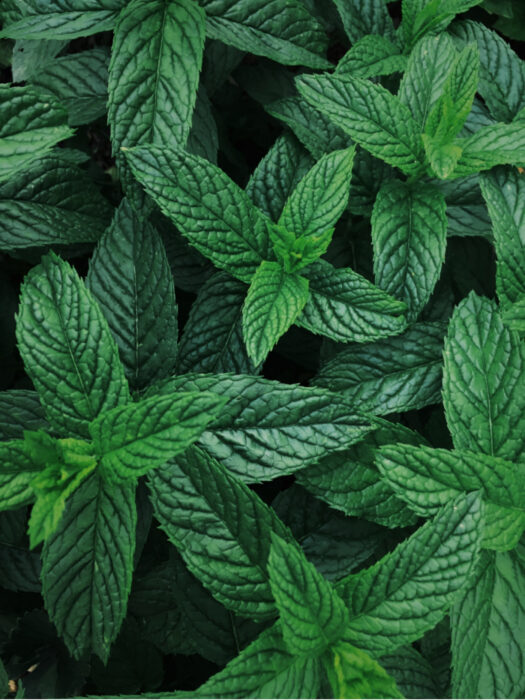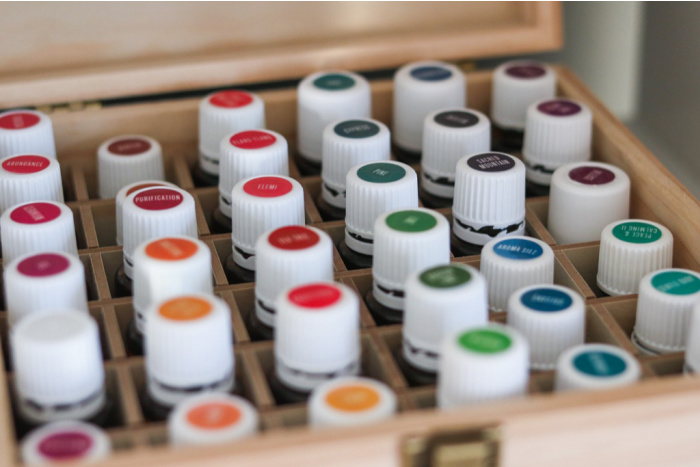Discover 25 Awesome Benefits of Using and Diffusing Peppermint Essential Oil
Peppermint oil is one of the most popular essential oils available. Gathered by cold extraction from the leaves of the peppermint plant, this oil is versatile, aromatic, and effective. Whether you’re interested in alternative medicine, want a natural treatment that’s perfect for a range of conditions, or simply enjoy the fresh, minty smell, we believe that peppermint oil belongs in every household. Learn more about the benefits of peppermint oil and explore 25 ways to add this oil to your daily routine.

How To Use Peppermint Essential Oil
1. Relief From Joint, Muscle, and Body Pain
If you suffer from muscle aches or joint pain, peppermint oil offers a perfect solution for your problem. This essential oil functions as a powerful natural pain killer with muscle-relaxing properties. You might be familiar with peppermint’s cooling sensation from swishing mouthwash or enjoying a minty candy cane. That same cooling effect can go to work on your body’s sore, painful areas.
You can treat your aches and pains in several different ways. Try applying two or three drops of peppermint oil to the affected area three times a day. You can also add five drops of oil to a bath along with Epsom salt for full-body relaxation.

2. Treat Headaches
Peppermint oil goes beyond body pain. You can also use this treatment to tackle tension headaches. Mint’s cooling, energizing effects can help you recover from headaches thanks to several different properties.
Peppermint oil boasts antispasmodic effects. If you’re struggling with headaches due to clenching your jaw, grinding your teeth, or carrying too much stress in your neck and shoulders, peppermint oil can help your muscles relax. Apply a few drops wherever you’re tense and feel yourself begin to relax.
Peppermint oil also acts as a topical analgesic. Rub a few drops into your temples, or wherever the headache feels worst, to enjoy some external relief.
3. Clear Your Upper Respiratory System
Peppermint oil’s fresh and spicy aroma can help you breathe easier. You can diffuse this oil throughout your home to aid many different upper respiratory complaints. Diffused peppermint can unclog nasal passages and soothe a sore throat. If your family is struggling with coughs, sinus infections, asthma, bronchitis, the common cold, or other concerns, peppermint oil can help them feel better.
Add a few drops of peppermint oil to your favorite diffuser to spread this oil throughout your home. You can also make a safe and natural chest rub for anyone fighting heavy congestion. Mix a few drops of peppermint with coconut oil, then gently apply to chests, necks, or directly under the nose.

4. Treat Seasonal Allergies
Peppermint is a common allergy treatment among the natural medicine community. Peppermint is a powerful expectorant, which means that it helps your body clear mucus, phlegm, and drainage from your respiratory tract.
This essential oil offers immediate relief from allergy symptoms. It also helps stop common allergic reactions from escalating into more serious infections. You can make allergy season easier on your family by diffusing peppermint oil throughout your house. If anyone is especially prone to allergies, apply two to three drops directly to their temples, chest, and the back of their neck.
5. Improve Energy Levels
If you need an energy boost but don’t want to turn to risky energy drinks, consider peppermint oil instead. Mint’s energizing effects can help you stay awake and alert in many different situations like lengthy car travel, study sessions, or late nights with friends and family. Some people also report improved memory performance when inhaling peppermint oil. Try it for yourself by adding a drop to your glass of water, or by applying two to three drops to your temples and the back of your neck.
6. Increase Athletic Performance
Athletes are drawn to peppermint for its energizing effects, but it can also boost performance in other ways. A clinical trial showed that peppermint oil increases the amount of air exhaled during exercise. Subjects also showed higher peak breathing flow rates and peak exhale flow rates.
Peppermint oil may have beneficial effects on the muscles that power your lungs. If you’re training for a particular event or competing athletically, consider adding peppermint oil to your workout routine.
7. Treat Migraines
Peppermint oil can help people with many different types of headaches. It can treat migraines in addition to tension and allergy headaches. The active ingredients in peppermint oil can increase blood flow, ease upset stomachs, and soothe tense muscles. All of these conditions can make a migraine worse. By treating these symptoms, peppermint oil can improve or relieve the migraine experience.
During a migraine, you can apply peppermint oil to the forehead, temples, and back of your neck to get relief. Peppermint offers painkilling, relaxing effects that help your headache become more bearable.

8. Manage IBS Symptoms
Peppermint oil can help treat irritable bowel syndrome or IBS. Mint helps reduce colon spasms, relaxes the muscles in your digestive system, and can even reduce gassy bloating.
Peppermint is proven to treat IBS symptoms such as bleeding, pain, discomfort, diarrhea, constipation, and urgency. Clinical trials usually involve taking peppermint oil capsules. You can try the capsule method, or simply add one or two drops of peppermint oil to a glass of water before each meal.
9. Strengthen Dental Health
Think about the toothpaste, mouthwash, and floss in your bathroom. There’s a reason why so many dental products are mint-flavored. Peppermint helps support dental health and hygiene thanks to its natural antibacterial properties. You can improve commercial toothpaste by adding a drop of peppermint oil before brushing.
10. Naturally Freshen Breath
A well-known use of peppermint oil is for freshening the breath. Peppermint’s strong but pleasing flavor can keep you smelling fresh, no matter what’s been on the menu. You can take a single drop of peppermint oil by mouth to keep your breath fresh at any time. If the effect is too spicy for you, you can drink a glass of water to rinse your mouth. Peppermint oil is a wonderful natural breath treatment because it doesn’t contain any artificial ingredients or sweeteners as you’ll find in many commercial breath drops.
11. Improve Hair Growth
If you’re struggling with hair loss, or simply want to see faster hair growth, add peppermint oil to your haircare routine. Mint ingredients are added to many high-end shampoos and hair treatments because they’re so effective. Peppermint is a natural way to nourish, restore, and thicken damaged hair.
This oil helps improve blood circulation to your hair follicles, making it a powerful option for people with thinning hair. You can enjoy the benefits for yourself by adding two or three drops of oil to your shampoo and conditioner each time you wash your hair.

12. Sooth Itchy Skin
Peppermint oil can help calm skin irritation and itchy skin. One of the health benefits of menthol, which is found in mint, is its ability to soothe itchiness. Irritated or itchy skin can be distracted, painful, and generally hard to live with. Peppermint oil can help relieve these symptoms.
You can treat itches by massaging two to three drops of peppermint oil into the affected area, or by soaking in a bath with 10 drops of oil. If you’re using oils on sensitive skin or you suffered allergic reactions to something, mix the peppermint oil with a soothing carrier oil before application.
For especially frustrating itches, try adding a few drops of lavender oil for an additional soothing experience.
13. Bug Repellant
People love the taste and smell of mint, but bugs don’t feel the same way. Pests such as spiders, ants, roaches, mosquitos, mice, ticks, and lice all hate the smell of mint. If you have water mint growing in your garden, you might have noticed that the bugs stay away from that patch.
You can enjoy this benefit through peppermint oil as well. Peppermint oil is proven to repel mosquitos and other insects for up to 150 minutes at a time. Keep your oil handy if you’ll be outside longer than that. You’ll need to reapply for long-lasting results.
14. Ease Nausea
Another application for this versatile oil is in relieving nausea symptoms. Nausea can be a problem for travelers, pregnant women, people recovering from surgery, and many other groups. Peppermint oil can help people feel less nauseated in several different circumstances.
See the benefits of using peppermint oil for nausea for yourself. Simply inhaling peppermint can help in many cases. You can also apply the oil behind your ears, on your neck, or someplace else where it’s easy to smell. Consider making peppermint tea by adding a few drops of oil to warm water if the circumstances allow.
15. Help Colicky Babies
Colic, or unexplained crying in infants and young babies, is a tough situation for the entire family. No parent feels comfortable when their baby is crying and screaming. Peppermint oil is a proven natural remedy for colic. Babies in a test group cried for significantly less time when consuming daily peppermint oil. The babies that were treated with peppermint saw the same results as babies given a major pharmaceutical treatment.
Children in the study were given one drop of peppermint oil per kilogram of body weight every day, for seven days. Because infants have such delicate systems, you should consult with your health care provider for medical advice before treating your baby with oil.
16. Improve Skin Health
Peppermint oil can naturally soothe, soften, tone, and reduce inflammation when applied to the skin. Thanks to its antibacterial and antimicrobial properties, mint oil can treat a range of skin concerns. Dermatology issues like blackheads, greasiness, dermatitis, and itchiness can all improve thanks to peppermint oil. You can also treat illnesses and infestations such as chickenpox, ringworm, and scabies with mint.
For natural acne treatment, combine two or three drops of peppermint oil with an equal amount of lavender oil. Apply this blend to any trouble areas for the best results.
17. Sun Protection
Peppermint oil has a naturally occurring sun protection factor, or SPF, that’s higher than most other essential oils. This means that you can put peppermint oil to work protecting your family from sun damage. Mix two or three drops of peppermint oil with about a teaspoon of coconut oil for each person, then apply it over the body. Make sure to reapply as you stay outside for the best protection.

18. Sunburn Relief
If you forget to reapply your sun protection blend and get a sunburn, peppermint oil can still keep you comfortable. Peppermint oil helps rehydrate your inflamed and sunburnt skin. It can also lessen any pain from sunburns thanks to its cooling, refreshing effects.
Use the same blend of two or three drops of peppermint oil and a teaspoon of coconut oil to soothe sun-damaged skin.
19. Lessen Cancer Risks
Research is still ongoing, but some studies show that peppermint oil can help fight cancer. The menthol in peppermint oil has been found to limit the spread of existing cancer by inducing appropriate cell death and managing cellular metabolism. Studies are still underway, but this research shows a promising trend. If you or a loved one are fighting cancer, ask your team about the medicinal purposes peppermint oil can play in your treatment.
20. Stimulate Your Mental Processes
If your mind is wandering, racing, or just unable to focus, peppermint oil can help you get back on track. The scent of peppermint helps many people improve their brain function and cognitive skills. Studies have shown that peppermint oil can solidify concept formation, memory retention, critical thinking skills, and attention span.
Peppermint oil can be a useful part of your work or study routine. Consider diffusing this oil while you’re reading, learning, or doing homework.
If a family member is preparing for an important exam, they can also use peppermint oil for better test performance. Apply peppermint oil topically while studying, and then before taking the exam. The familiar scent will help their brain access stored information that they absorbed while preparing.

21. Reduce Abdominal Pain
Peppermint oil can relieve abdominal pain in children and adults. Pain in this area can have a variety of causes. Overeating, anxiety, food allergies, IBS, gluten intolerance, growing pains, and other concerns can all show up in the body as abdominal pain. Peppermint oil can help alleviate many different abdominal pain symptoms.
Some research has shown that peppermint oil capsules help relieve abdominal pain in children. You can try capsules or mix a couple of drops with water to test this method. Topical applications can also help. Peppermint’s cooling effect can reduce pain and muscle spasms. If you’re struggling with painful digestion, topical peppermint oil can help you feel better.
Finally, peppermint oil has soothing, relaxing qualities. People who have abdominal pain due to stress, worry, or anxiety may be able to calm down by smelling peppermint oil. Add a few drops to your essential oil diffuser to spread the scent throughout your home.
22. Relieve Cracked Nipples
Breastfeeding mothers can struggle with painful cracked or chapped nipples. The pain-relieving qualities of peppermint oil make it a useful natural remedy. Many breastfeeding women are reluctant to put anything unnatural on their nipples since their children could wind up consuming their treatment. Peppermint oil is a fully natural solution to breastfeeding pain.
You can make a nipple cream by combining two or three drops of peppermint oil with coconut oil or another soothing carrier oil. Apply this mixture to the nipples to relieve pain and calm irritated skin. If your baby doesn’t seem to enjoy the scent of peppermint oil, you can apply your oil after feeding. This gives the peppermint oil plenty of time to work before your baby eats again. Meanwhile, it also allows the scent to fade for sensitive noses.
23. Clarify Your Thoughts
Peppermint oil can help you achieve peace of mind and stop racing thoughts. Peppermint assists many people with academic and mental performance. However, this oil can also help you tune in to your most important train of thought. You can achieve better focus and clarity by smelling peppermint oil when you need to concentrate. Consider diffusing a few drops throughout the area to help yourself think.
24. Reduce Indigestion
Everyone overindulges from time to time. Whether it’s a holiday, you’re enjoying a special meal, or you simply ate more than you needed, peppermint oil can help reduce indigestion. This oil’s calming, anti-spasmatic properties help your digestive system relax.
Inhaling peppermint oil can help relieve any nausea you feel due to your stomach upset. Carry peppermint oil with you to restaurants, family gatherings, and while traveling to protect yourself from indigestion. You can also diffuse this oil throughout your home for similar effects.
If the aroma of peppermint isn’t relieving your upset stomach, you can try taking a few peppermint oil capsules or consuming two to three drops in water.
25. Help Anxiety
People living with anxiety face constant worries and stresses. Peppermint oil offers a natural, non-invasive treatment for anxious minds. The calming scent of mint can help people focus, concentrate, and disregard anxious thoughts. Peppermint oil relieves physical symptoms of anxiety such as headaches, indigestion, and abdominal pain.
This oil is also valuable as part of mental health practices. Diffuse peppermint oil while meditating, journaling, or being creative. The mind will build positive associations with the scent. When you start to feel anxious or worried, take a deep breath of peppermint oil to remind yourself of better, calmer times.






